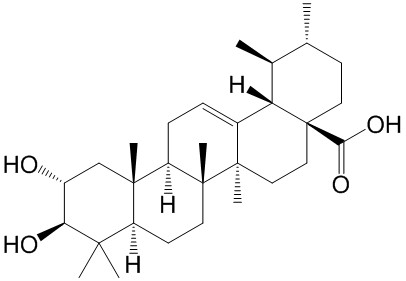Home
Products
Corosolic acid



| Product Name | Corosolic acid |
| Price: | $51 / 20mg |
| Catalog No.: | CN07936 |
| CAS No.: | 4547-24-4 |
| Molecular Formula: | C30H48O4 |
| Molecular Weight: | 472.7 g/mol |
| Purity: | >=98% |
| Type of Compound: | Triterpenoids |
| Physical Desc.: | Powder |
| Source: | The barks of Lagerstroemia speciosa |
| Solvent: | Chloroform, Dichloromethane, Ethyl Acetate, DMSO, Acetone, etc. |
| SMILES: | C[C@@H]1CC[C@]2([C@@H]([C@H]1C)C1=CC[C@H]3[C@@]([C@@]1(CC2)C)(C)CC[C@@H]1[C@]3(C)C[C@@H](O)[C@@H](C1(C)C)O)C(=O)O |
| Contact us | |
|---|---|
| First Name: | |
| Last Name: | |
| E-mail: | |
| Question: | |
| Description | Corosolic acid isolated from the fruit of Cratoegus pinnatifida var. psilosa, was reported to have anticancer activity.IC50 value: 26.8 μg/ml in vitroTarget:In vitro: Corosolic acid displayed about the same potent cytotoxic activity as ursolic acid against several human cancer cell lines. In addition, the compound displayed antagonistic activity against the phorbol ester-induced morphological modification of K-562 leukemic cells, indicating the suppression of protein kinase C (PKC) activity by the cytotoxic compound. The compound showed PKC inhibition with dose-dependent pattern in an in vitro PKC assay [1]. MTT method was used to detect the influence of corosolic acid on A549 lung cancer cell growth in vitro under different concentrations. The value of IC50 was 26.8 μg/ml in vitro experiment. Corosolic acid of different doses had certain therapeutic effects on A549 solid tumor, the content of VEGF and CD34 proteins also had different degrees of influence [2]. Corosolic acid induced apoptosis in CT-26 cells, mediated by the activation of caspase-3. It inhibited the proliferation and tube formation of human umbilical vein endothelial cells and human dermal lymphatic microvascular endothelial cells, decreased the proliferation and migration of human umbilical vein endothelial cells stimulated by angiopoietin-1 [3]. In vivo: A mouse colon carcinoma CT-26 animal model was employed to determine the in vivo anti-angiogenic and anti-lymphangiogenic effects of corosolic acid. |
| Density | 1.1±0.1 g/cm3 |
| Boiling Point | 573.3±50.0 °C at 760 mmHg |
| Flash Point | 314.6±26.6 °C |
| Exact Mass | 472.355255 |
| PSA | 77.76000 |
| LogP | 7.82 |
| Vapour Pressure | 0.0±3.6 mmHg at 25°C |
| Storage condition | 2-8°C |